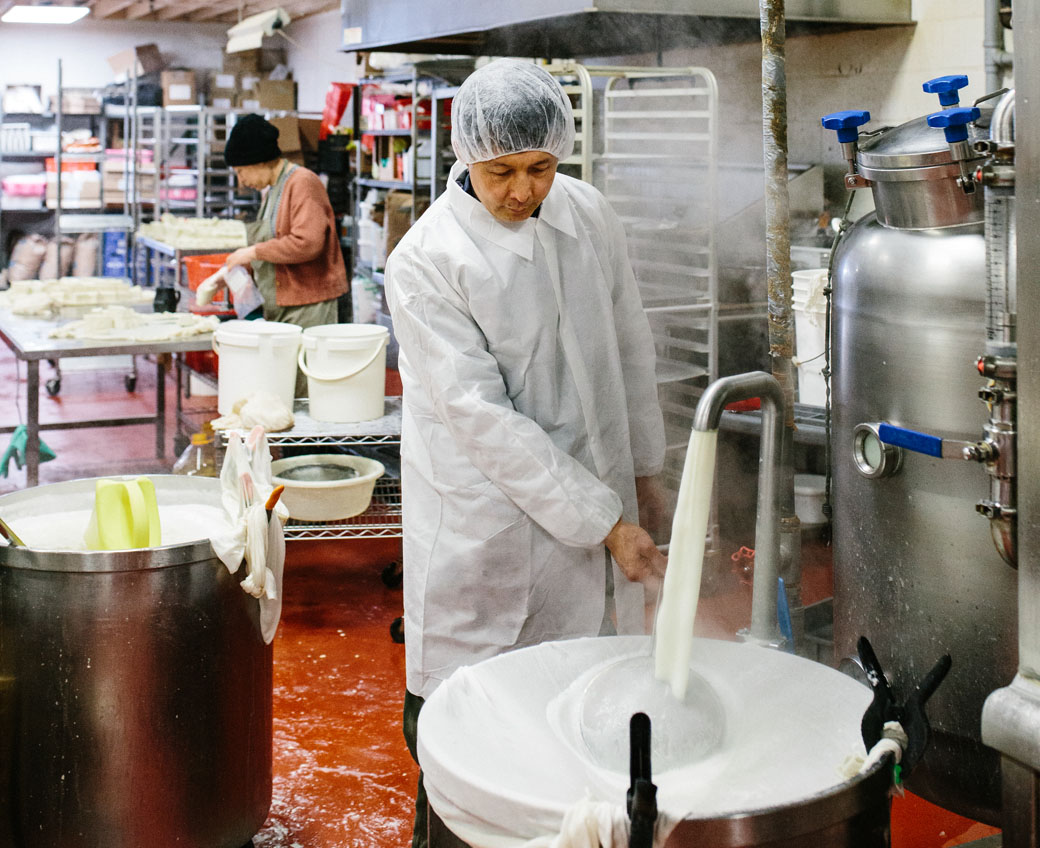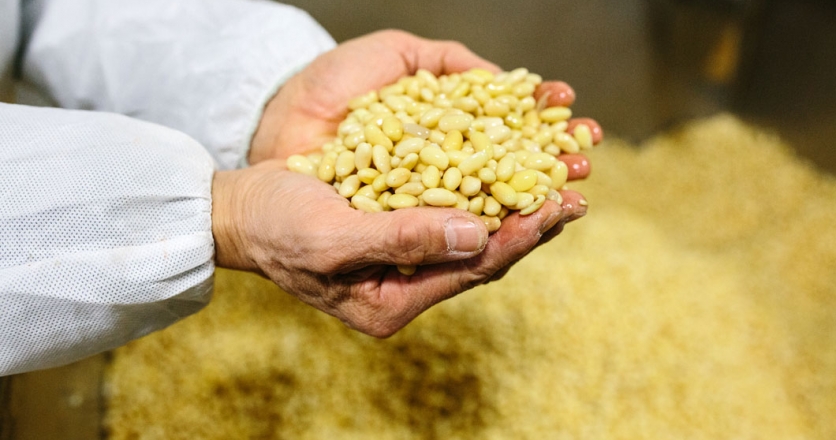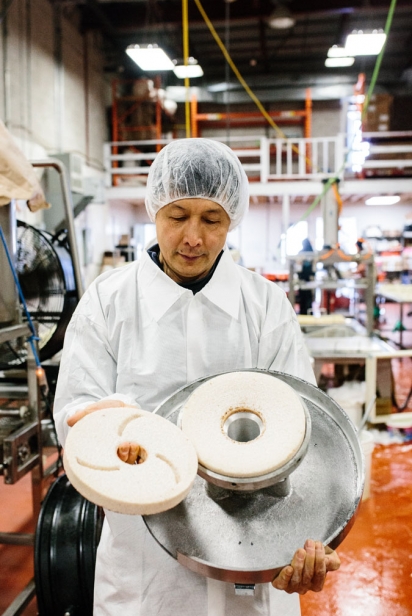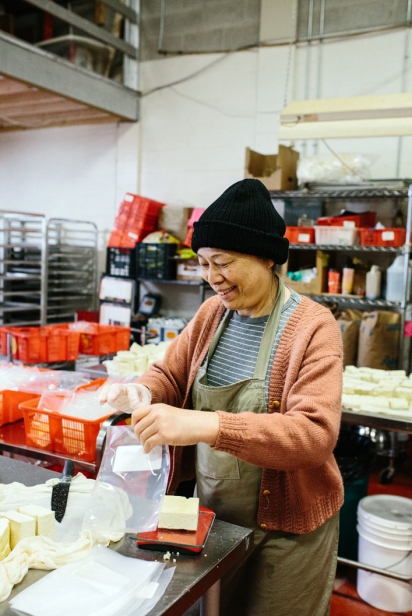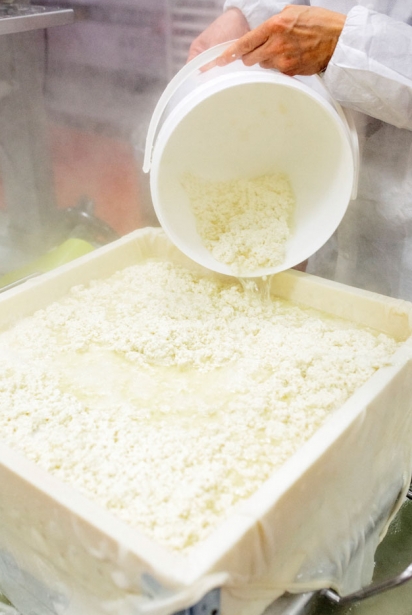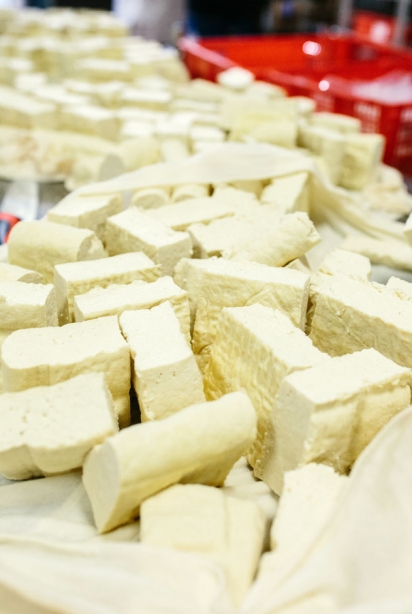Mastering the Taste of Home
Ming Yu was left with a bad taste in his mouth the first time he ate tofu in Canada. It was the early 1990s and Yu, then a masters student in political science at Western University, had waited an entire year after his arrival here to tuck into a plate of bean curd. His wife, Christy Zhang, had just joined him from China, and, to celebrate, they made a trip to a Chinese grocery store to share in what they thought would be some familiar tastes of their homeland.
"The first piece I put in my mouth, I froze," Yu recalls. "It didn't even taste like tofu."
Yu would know. He grew up in Harbin, a place he calls the tofu capital of China for all the soybeans the region produces. Even during the Mao Era in China and the controversial leader's cultural revolution of the 1960s when food was rationed, tofu was still a mealtime staple and a tasty one at that.
It was made in small shops by hand, carted to neighbourhood stores and sold, still warm, without packaging. On special occasions, Yu's mother would buy "tofu deli," chunks of tofu cooked with a sweet and spicy sauce that was his favourite as a boy.
Tofu in Canada, while more readily available, tasted chalky by comparison. It was made with a cheap coagulant called calcium sulphate. Outside of the food world, it's known as gypsum and is the main ingredient in drywall, cement, plaster of Paris — even blackboard chalk. So Yu's discerning palate wasn't off the mark when he took that first fateful bite of Canadian tofu all those years ago.
Watching her husband choke back his meal, Zhang mused she'd start making tofu herself. It would be reminiscent of what she and Yu were accustomed to eating in China. The kind made the same way for 2,000 years by master tofu-makers using nigari, magnesium chloride, to curdle soy milk. A byproduct of extracting salt from seawater, nigari gives tofu a sweet note and a smooth and clean texture.
Yu figured his wife was kidding, but 10 years and many disappointing tofu encounters later, Zhang hung out a shingle for Ying Ying Soy Food in Brantford, where the couple was living at the time. It would be a traditional tofu company, forgoing gypsum for nigari, using that millennia-old technique to turn soy milk into tender blocks of bean curd.
There was just one catch. "We didn't know how to make tofu," Yu says. "We just ate tofu."
The couple hired a longtime tofu-maker from Harbin to come to Canada and teach Zhang the techniques that would set Ying Ying Soy Food apart from other commercial tofu processors.
Yu, who was working in banking at the time, wasn't convinced making nigari tofu had legs as a business plan, despite his longing for traditional tofu. "At the time, I thought it was a bad idea. Who cares about tofu in this country?" he says.
Still, Zhang persevered. Banking on Chinese immigrants' hunger for traditional tofu to sustain the business, however, turned out to be a mistake. No matter how good Ying Ying tofu may have tasted, those in the Chinese community were put off by the price, which was twice that of the calcium sulphate-infused versions.
"When I told them it was traditional, it didn't mean anything to them, especially because of the price," Yu says.
In 2002, the couple tried convincing a different crowd of traditional tofu's merits. They got a booth at the Toronto Vegetarian Festival and after two days, they sold out of their cooked, flavoured gourmet tofu, similar to what Yu ate on those special occasions growing up.
"People tried it and asked ‘Where can we buy it?' We said, ‘nowhere,'" Yu says. "They came back the next day and bought it all to freeze."
Still, it gave Yu and Zhang an idea: Maybe Ying Ying Soy Food had a place in health-food stores. Despite his skepticism at first, Yu started to believe in his wife's fledgling business — enough to take a year off from banking in 2003 to market Ying Ying tofu. By 2004, Yu quit banking altogether and threw himself into spreading the word about nigari tofu. The couple opened a store at the St. Lawrence Market, first with a table in the north building farmers' market before moving to a more permanent set-up in the south building, which is still in operation. Their presence there gave Yu the chance to talk to people. He was surprised to learn that some of them knew more about nigari than he did.
"In the course of a few years, I learned why tradition becomes tradition, why it means something. Tradition is good for all people," he says. "It was at the market where I had the opportunity to tell our story, why we're doing what we do and why our tofu is good."
Among those hanging onto his every word was a chef at the top of the food chain from the Service Inspired Restaurants conglomerate that includes Jack Astor's eateries. That connection got Ying Ying tofu onto foodservice distribution trucks and the couple's popular sweet and spicy tofu onto plates of Pad Thai at Jack Astor's. Smaller independent restaurants started buying what Ying Ying was selling, too, adding nigari tofu to their recipes.
Most recently, meal-kit delivery outfit Hello Fresh started sourcing Ying Ying's plain blocks, buying upwards of 2,000 a week — an order that keeps the small factory, now in Mississauga, busy for days at a time.
"Business just comes out of the blue," Yu says as he watched his small staff produce the next big order. "I'm not equipped for mass production at all. Almost for 19 years, we've stuck to an organic growth principle. I've hardly done any advertising."
The couple also hasn't strayed from the original MO as the business has grown to process 480 pounds of soybeans a day — and it still processes everything by hand.
Ying Ying tofu starts as organic soybeans, grown west of London, Ont., which are soaked for one to two days, depending on the time of year and temperature. The beans are ground twice, separating the pulp from the milk, which is heated to just shy of boiling to eliminate a natural inhibitor that prevents coagulation and digestion. The process makes the milk foamy, but rather than use an approved food-grade chemical to fight the froth, Yu relies on a high-powered whisk and cold water, which makes the tofu chewier.
"I've learned so much about food and I was convinced food should be pure and clean. Clean not in the sense that there's no dirt from the field… but there are too many chemicals and I said I'm sure there's a way [to do this without chemicals]. Ancient Chinese tofu makers did not use this."
Nigari is then added to curdle the milk. Those bits of solidified soy milk are poured by the bucketful into square molds lined with tofu cloth, like cheesecloth, and pressed to varying thicknesses, depending on whether the tofu will be used for thin strips of the gourmet product or the hefty hand-cut plain blocks.
"That's why my tofu looks awkward," Yu explains. "But now I take pride in it. When a customer complains, I say it's all handcut. They don't look good, but they taste good."
So does the sweet success the couple has enjoyed. Looking back, Zhang was right to pursue her passion, Yu says. And he was right to join her.
"I only regret that we came to this country a little too late. If I were in my 20s, I could have done this a lot longer. I'm grateful to my wife. For three years, she lost money every month, but she was tenacious. This [business] has become a mission."
Ying Ying Soy Food Ltd.
2359 Royal Windsor Dr., Mississauga, Ont.
yingyingsoyfood.ca | 905.847.5592


